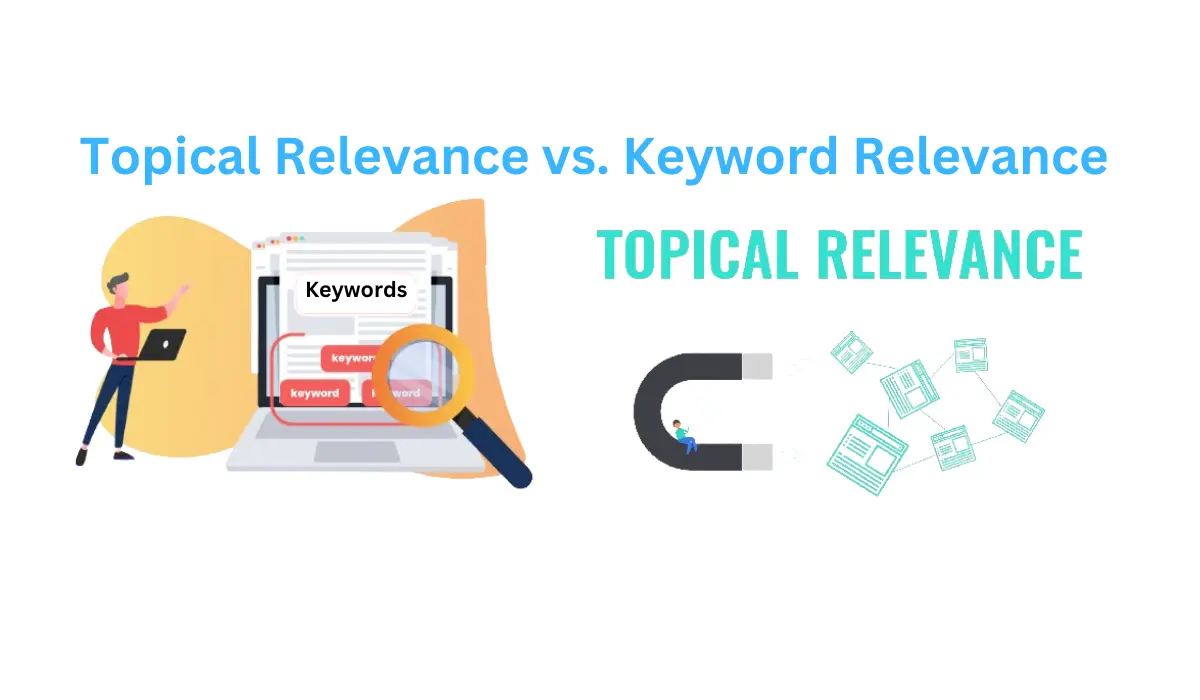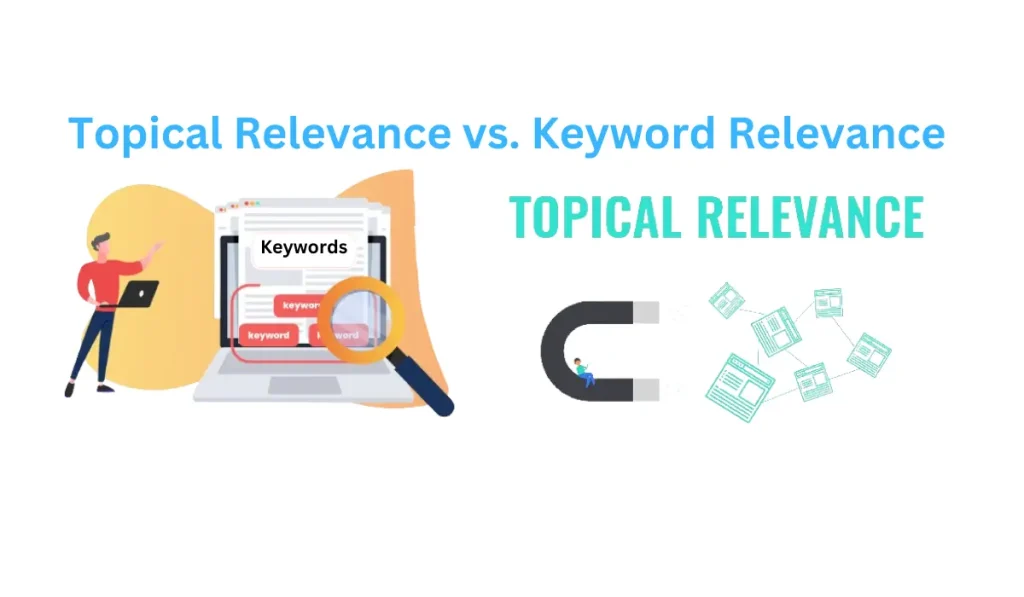In the ever-evolving landscape of search engine optimization (SEO), achieving high rankings on search engine results pages (SERPs) requires a delicate balance between two essential concepts: topical relevance and keyword relevance. While both are crucial for SEO success, understanding the differences and finding the right equilibrium between them can significantly impact your website’s visibility and organic traffic. In this article, we talked about topical relevance vs. keyword relevance and explored strategies to strike the perfect balance for optimal SEO results.
What is Topical Relevance
Topical relevance refers to the alignment of your content with the overarching theme or subject matter of your website. It involves creating comprehensive, in-depth content that covers a specific topic comprehensively. Search engines like Google increasingly prioritize websites that demonstrate topical authority, as they aim to provide users with the most relevant and comprehensive information.
To establish topical relevance, focus on creating content clusters or topic hubs. This involves creating a pillar page that serves as the authoritative guide to a broad topic, supplemented by supporting content pieces that delve into related subtopics in greater detail. By organizing your content in this manner, you signal to search engines that your website is an authoritative resource on the subject, thereby enhancing your chances of ranking higher in relevant search queries.
What is Keyword Relevance
Keyword relevance, on the other hand, pertains to the incorporation of targeted keywords within your content to improve its visibility in search engine results. Keywords are the terms and phrases that users type into search engines when seeking information, products, or services. While traditional keyword research remains important, modern SEO emphasizes the use of semantic keywords—words and phrases closely related to the main topic—to enhance context and relevance.
Keyword relevance involves strategically integrating primary and secondary keywords into your content, including headings, subheadings, meta tags, and body text. However, it’s crucial to avoid keyword stuffing, as this can result in a poor user experience and may even lead to penalties from search engines. Instead, focus on creating natural, reader-friendly content that seamlessly incorporates relevant keywords while maintaining coherence and clarity.
Topical Relevance vs. Keyword Relevance
Topical relevance and keyword relevance are both crucial concepts in the realm of search engine optimization (SEO), but they represent distinct aspects of optimizing content for search engines. Here’s a breakdown of the key differences between the two:
Definition:
Topical Relevance: Refers to how well a piece of content aligns with the overarching theme or subject matter of a website or specific page. It focuses on demonstrating expertise and authority within a particular topic or niche.
Keyword Relevance: Involves the strategic use of specific keywords within content to improve its visibility and ranking in search engine results. It centers on incorporating words and phrases that users are likely to search for when seeking information related to a particular topic.
Focus:
Topical Relevance: Centers on the holistic coverage of a topic, encompassing various aspects and subtopics to provide comprehensive information. It prioritizes depth of content and authority within a specific subject area.
Keyword Relevance: Focuses on optimizing content around specific keywords or search terms to match the language used by users when conducting searches. It emphasizes the strategic placement of keywords to signal relevance to search engines.
Intent:
Topical Relevance: Aims to establish the website or page as a trusted resource and authority within its niche. It seeks to satisfy the information needs of users by providing comprehensive and valuable content on a particular topic.
Keyword Relevance: This aims to improve the visibility of content in search engine results pages (SERPs) by aligning with the terms and phrases users are likely to use when searching for relevant information. It seeks to attract organic traffic by matching search intent with optimized content.
Implementation:
Topical Relevance: Achieved through the creation of comprehensive, high-quality content that thoroughly explores a particular topic or subject area. It involves organizing content in a structured manner, such as through content clusters or topic hubs, to demonstrate expertise and authority.
Keyword Relevance: Implemented by strategically integrating targeted keywords into various elements of content, including titles, headings, meta tags, and body text. It requires conducting keyword research to identify relevant terms and incorporating them naturally into the content while avoiding keyword stuffing or over-optimization.
Longevity:
Topical Relevance: Endures over time as long as the core subject matter remains relevant to the target audience. It may require periodic updates to reflect changes or advancements within the topic area.
Keyword Relevance: This can be influenced by changes in search engine algorithms, user behavior, and trends in keyword usage. It may necessitate ongoing monitoring and adjustment to maintain alignment with evolving search patterns.
Also Read
Striking the Balance
Balancing topical relevance and keyword relevance is essential for crafting an effective SEO strategy that improves search engine rankings and provides valuable content to users. Here’s how you can strike the right balance between these two aspects:
Start with Comprehensive Keyword Research:
Conduct thorough keyword research to identify relevant terms and phrases related to your topic. Look for keywords with decent search volume and moderate competition.
Explore long-tail keywords and semantic variations that reflect user intent and cover various aspects of your topic.
Create High-Quality, Authoritative Content:
Develop comprehensive content covering your chosen topic while naturally incorporating targeted keywords. Focus on providing value to users by addressing their questions, needs, and interests.
Prioritize quality over quantity, aiming for in-depth, well-researched content that establishes your website as a trusted authority within your niche.
Structure Content for Both Users and Search Engines:
Organize your content logically and hierarchically, using descriptive headings and subheadings to improve readability and navigation.
Incorporate targeted keywords strategically in titles, headings, meta tags, and body text, but ensure that they blend seamlessly into the natural flow of the content.
Optimize for Semantic Search:
Embrace semantic SEO by including related terms and phrases that enhance the context and relevance of your content. Use synonyms, variations, and related concepts to broaden your content’s semantic footprint.
Focus on addressing user intent by understanding the underlying motivations behind search queries and providing comprehensive answers and solutions.
Create Topic Clusters and Internal Linking:
Implement a topic cluster strategy by organizing related content around pillar pages or cornerstone content pieces that serve as the authoritative hub for your topic.
Use internal linking to connect related content within your website, signaling to search engines the interconnectedness of your content and reinforcing topical relevance.
Monitor Performance and Iterate:
Regularly monitor your website’s performance using analytics tools to track keyword rankings, organic traffic, and user engagement metrics.
Analyze search engine algorithm updates and user behavior trends to identify opportunities for refinement and optimization.
Continuously iterate and improve your content and SEO strategy based on insights and feedback from both users and search engines.
End Words
By striking the right balance between topical relevance vs. keyword relevance, you can enhance your website’s visibility, attract targeted organic traffic, and ultimately achieve better results in search engine rankings. Remember, SEO is an ongoing process that requires constant refinement and adaptation to keep pace with evolving algorithms and user behaviors. Embrace a holistic approach that prioritizes both quality content and strategic keyword optimization to maximize your SEO efforts and drive sustainable growth.





